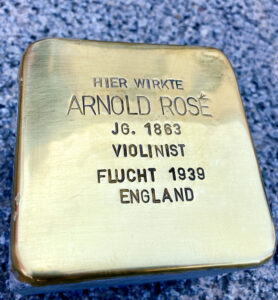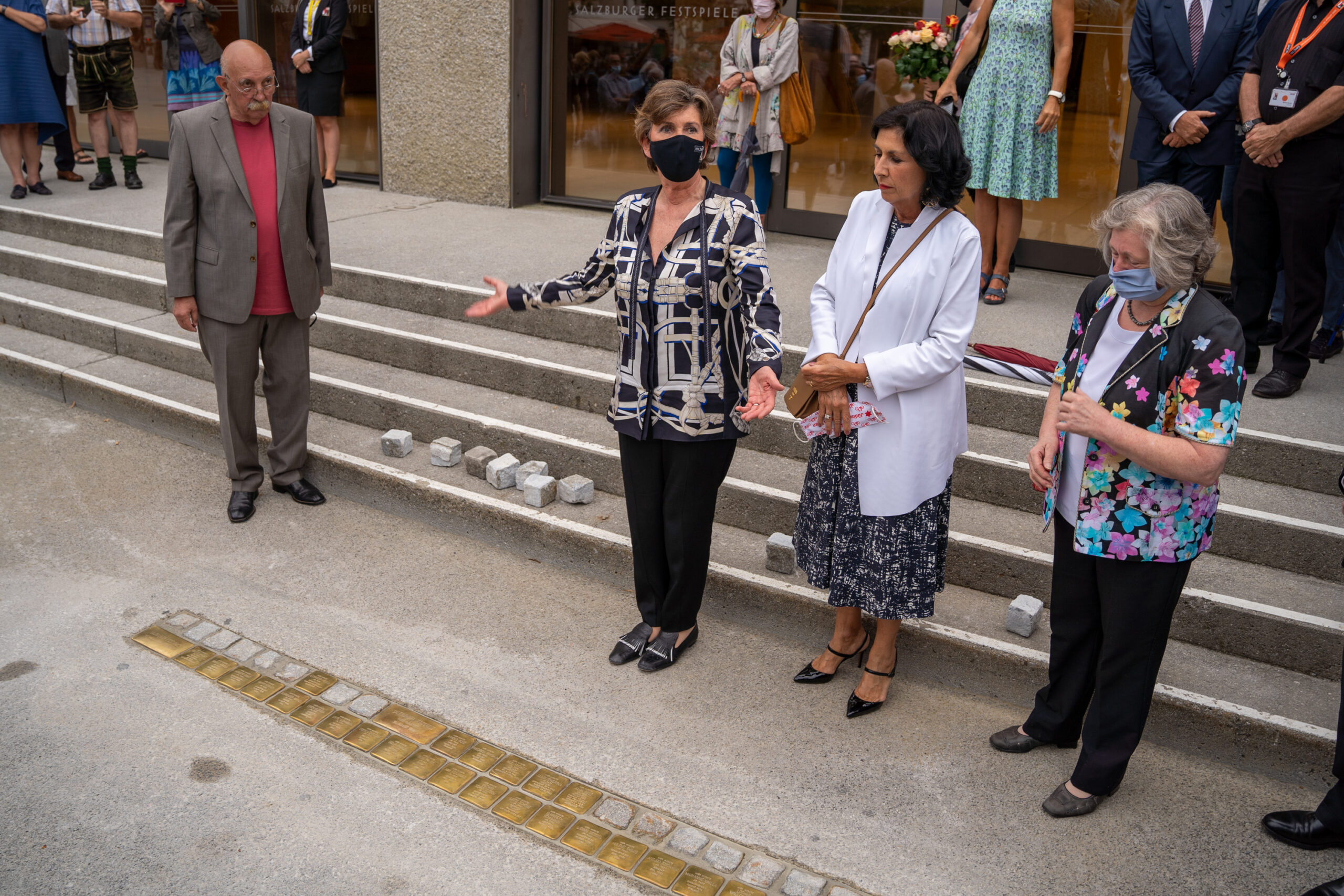Arnold ROSÉ was born in Iaşi Romania on October 22, 1863. He was the third of four sons of the Jewish couple Marie and Hermann Rosenblum, a coach builder. In the 1860s the family moved to Vienna, the Habsburg capital and imperial residence, and in 1899 they changed their names from Rosenblum to Rosé.
Arnold’s parents Marie and Hermann Rosé both died during the last decades of the Habsburg Monarchy, in 1905 and 1914 respectively. They were buried in the Jewish section of the Vienna Central Cemetery at Gate 1.
In 1891, long before their parents’ deaths, the brothers Alexander, Eduard, Arnold and Berthold converted in Vienna to the Reformed (Calvinist) Protestant Church. This change of religious affiliation removed some career barriers, but the brothers were still faced with the »racial« Antisemitism that became so popular in the 1890s and later.
On March 10, 1902 Arnold ROSÉ married Justine Mahler in the Lutheran Church in the 1st District’s Dorotheergasse. Justine was the sister of the famous composer and Court Opera conductor Gustav Mahler. They had two children: Alfred was born on December 11, 1902, and Alma was born on November 3, 1906. Both were baptized as Protestants.
Arnold ROSÉ had a well-known musical career: violinist, concertmaster of the Court Opera orchestra, member of the Vienna Philharmonic, professor at the Vienna Music Academy and the conservatory of the Friends of Music Society, and last but not least founder and first violinist in the internationally famous Rosé-Quartet (honored with the world premieres of works by Erich Wolfgang Korngold, Arnold Schönberg, and Anton Webern).
Arnold ROSÉ was involved in first Cercle-Konzert that the Salzburg Festival Hall Society held on January 31, 1920 in the Vienna City Palace of Prince Eugene in order to raise money for its building fund. Salzburg first got to know Arnold ROSÉ in 1922: as concertmaster for the Vienna Philharmonic performing four Mozart operas under the direction of Richard Strauss, and as first violinist of the Rosé-Quartet in two Matinee-Concerts in the Mozarteum Great Hall on August 14th and 16th (for some reason the two matinee concerts were not noted in the annals of the Salzburg Festival).
Altogether the Rosé-Quartet performed in nine chamber music concerts at the Mozarteum during the Salzburg Festivals of 1922, 1925, 1926, 1930, 1935 and 1936. The last of these concerts, on Sunday morning August 30, 1936, included an unexpected surprise: a woman, Alma ROSÉ, the daughter of the first violinist, rejuvenated the cast of the »time-honored« Rosé-Quartet.
The Salzburg Festival could not offer a program for this surprise concert so the audience was left uninformed about the pieces of music and the performers, as one critic noted:
There were no programs through an inadequate organization. One was therefore dependent on an announcement. That meant that you had to rely primarily on your own knowledge of the music. The names of the performers were also kept from the audience …
The well-known daughter Alma, an elegant and virtuoso violinist, complemented the quartet of Messrs. Rosé, Stwertka, Fischer and Buxbaum. …
The rendering of these masterpieces of course sparked great delight and the »time-honored« quartet was thanked for such an artistic presentation that was so deeply mature.
Salzburger Chronik, August 31, 1936, p. 8
In this matinee concert the 29 year old violinist Alma Rosé and the 60-72 years old Messrs. Arnold ROSÉ (violin), Friedrich Buxbaum (cello), Julius Stwertka (viola) and Paul Fischer (violin, viola) played only works by Mozart: quintet in G minor (KV 516), quintet in A major (KV 581) and quartet in E flat major (KV 428).
It was the last brilliant performance of the Rosé-Quartet in Salzburg.
In March 1938 – even before the »Nuremberg Racial Laws« took effect in Austria – the 74 year old Arnold ROSÉ was expelled from the orchestras of the Vienna State Opera and the Vienna Philharmonic. ROSÉ then ironically tried to put his state of mind into words:
As you rightly suspect, after 57 years in the opera, 56 years in the quartet and 44 years in the Court Musikkapelle, I have sunk into retirement, without a sound.
Then his wife Justine died in Nazi ruled Vienna at age 69. On August 24, 1938 the Neue Freie Presse published a death notice marked with a Christian Cross:
We wish to inform all friends and acquaintances that on August 22, 1938, our dearly beloved wife and mother Justine Rosé-Mahler was gently released from long, difficult suffering.
Arnold Rosé / Alfred and Maria Rosé / Alma Rosé
Arnold ROSÉ’s son Alfred and daughter-in-law Maria were able to go to the US without any difficulties in the autumn of 1938. Alma Rosé, was free to travel thanks to her Czechoslovakian passport, took the initiative to arrange a flight into exile for her father Arnold, who was suffering from severe depression in Vienna.
The 75 year old arrived in his London exile on May 1, 1939.
Arnold ROSÉ became very concerned for his daughter Alma who was trapped in Holland when the Germans invaded it in May 1940. And he had long been worried about his brother Eduard, who remained alone in Nazi Germany after his two sons managed to escape to the US.
Only after the end of the war did Arnold ROSÉ learn about the death of his older brother Eduard in the Theresienstadt Concentration Camp and of his daughter Alma in Auschwitz.
He then suffered a severe heart attack and died in London at the age of 82 on August 25, 1946.
Sources
- The official Jewish community (Israelitische Kultusgemeinde) of Vienna
- Archive of the Salzburg Festival
- Österreichisches Biographisches Lexikon
- Richard Newman: Alma Rosé, Wien 1906 – Auschwitz 1944. Eine Biografie, Bonn 2003
- Bernadette Mayrhofer, Fritz Trümpi: Orchestrierte Vertreibung. Unerwünschte Wiener Philharmoniker. Verfolgung, Ermordung und Exil, Wien 2014
Translation: Stan Nadel
Stumbling Stone
Laid 17.08.2020 at Salzburg, Max-Reinhardt-Platz

 Alma and Arnold Rosé, date unknown
Alma and Arnold Rosé, date unknownPhoto: Gustav Mahler–Alfred Rosé Collection, Music Library, Western University, London, Canada
 Arnold and Alma Rosé after their flight from Vienna
Arnold and Alma Rosé after their flight from ViennaPhoto: Gustav Mahler–Alfred Rosé Collection, Music Library, Western University, London, Canada

 Relocation of the Salzburg Festival, August 17, 2020 (Max-Reinhardt-Platz): Gert Kerschbaumer, Helga Rabl-Stadler, Danielle Spera, Hanna Feingold
Relocation of the Salzburg Festival, August 17, 2020 (Max-Reinhardt-Platz): Gert Kerschbaumer, Helga Rabl-Stadler, Danielle Spera, Hanna FeingoldPhoto: Salzburger Festspiele/Lukas Pilz
